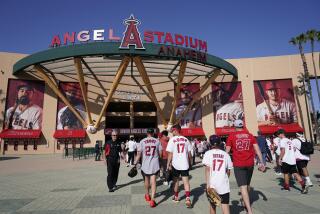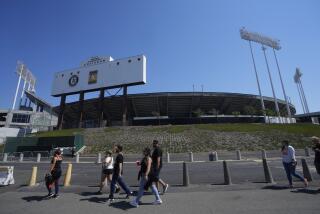Raiders’ Court Document Hints Irwindale Deal Is Dead
- Share via
The Los Angeles Raiders, in a new court filing in the lawsuit against them by the Coliseum, have declared that their legal obligations in the agreement they signed last year to move to Irwindale have “lapsed,” it was learned Saturday.
Despite the use of such language for the first time by a Raiders attorney, an Irwindale negotiator said that talks for a final contract to build a Raiders stadium in Irwindale continue, and that the team’s plans to move eventually to the San Gabriel Valley city have not changed.
Representatives of the football team could not be reached for comment. But the wording of the team’s court filing sounded a new note of uncertainty in the troubled deal.
The Los Angeles Superior Court filing by Raiders attorney Richard Haas, dated Sept. 29, said that because Irwindale provided neither the promised building sites nor the $115 million loan as required by the Aug. 20, 1987, preliminary agreement, no binding contract has been signed. “Any obligations of (the) Raiders lapsed shortly after” the preliminary agreement, the filing said.
Later in the same filing, the team’s attorney declared: “There never was an agreement binding on (the) Raiders, because Irwindale did not perform what was necessary to ripen any promise of (the) Raiders.”
Coliseum Commission attorney Marshall Grossman said Saturday this is an indication that the Irwindale agreement is off.
Haas was unavailable for comment. But Fred Lyte, one of Irwindale’s two principal negotiators with the Raiders, said the deal is not off and discussions with Raiders boss Al Davis are continuing.
Within a month of the signing of the Aug. 20 preliminary agreement, the deal was delayed by a court’s order of an environmental impact report on the proposed stadium. The report has not been completed. In the meantime, there have been reports of trouble in arranging financing for the stadium.
More to Read
Go beyond the scoreboard
Get the latest on L.A.'s teams in the daily Sports Report newsletter.
You may occasionally receive promotional content from the Los Angeles Times.










